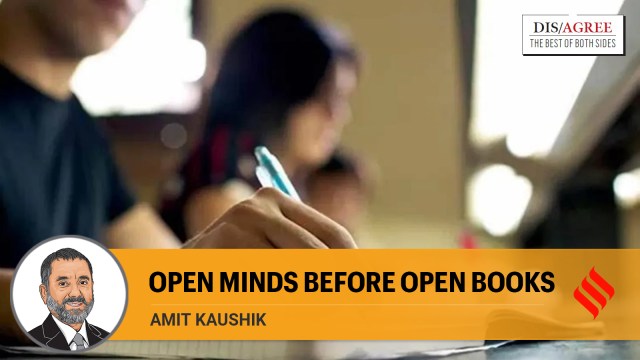
Recent media reports suggested that CBSE was considering the introduction of open book examinations (OBE) in select schools on a pilot basis, although it was later clarified that only a study on their feasibility was under consideration. Should the study recommend their introduction, OBEs would initially be introduced in grades IX and XII, and not as part of the board examinations.
As a form of assessment, OBEs can be useful tools to determine the progress made by an individual learner. The New Education Policy 2020 (NEP) recommended a shift to a more inquiry-based, competency-based system of learning and assessment. OBEs require students to be able to think, analyse, and apply acquired knowledge to given situations, thus allowing evaluators to assess their ability to utilise the crucial 21st century skills of critical thinking, creativity, collaboration, and communication that are increasingly valued all over the world.
In India, board examinations at grades X and XII have become annual anxiety-inducing, high-stakes exercises, with unsuccessful students often harming themselves. The run-up to the board examinations is nearly as bad, with students being pressured to perform from grade IX onwards. Anything that boards can do to reduce the stress of students, parents, and teachers is a welcome step, and the open book format should be seen in this light.
It is worth recalling that CBSE had introduced OBEs in 2013-14, but they were eventually withdrawn based on feedback from parents and teachers. A major reason for discontinuing them was the lack of preparation within the system. Reintroducing OBEs will require more than just a change to the form of examination. Since such assessments require students to be able to analyse and apply knowledge, teaching in the classroom will also need to privilege independent thinking and creativity; the business-as-usual form of rote learning will no longer be appropriate. Nor will the kinds of questions presently set in school examinations — exam setters will have to learn how to craft original and imaginative questions that challenge students to think and apply learning. And finally, teachers will need to be trained to evaluate OBE submissions in a fair and consistent manner, which, in turn, implies empowering them and returning to them some of the academic autonomy that has been lost over the last several years.
The NEP provides a broad policy direction within which several steps need to be taken to improve school education and move away from rote learning. Several initiatives will be needed to support these reforms, at both central and state levels, and some changes are already becoming visible. For instance, Delhi became the first state in the country to deliver a fully competency-based board examination for grades X and XII in 2023, through the newly established Delhi Board of School Education. The reintroduction of OBEs would be in keeping with the policy intention of NEP.
Any plans to reintroduce this format of assessment should take into account the learning from the last short-lived attempt to do so, as well as the distortions that crept into the so-called Continuous Comprehensive Evaluation (CCE) that became overly prescriptive. An ideal solution would be for the board to introduce broad guidelines for such assessments, leaving schools and teachers with the autonomy to administer them as they consider appropriate in the context of their individual schools and students.
As any class teacher will tell you, students in a classroom are usually at varying levels of ability; a small proportion will be one to two grade levels ahead, a similar proportion will be one or two grade levels behind, while the bulk will be more or less at grade level. An assessment, whatever its form, is merely a tool to provide information about where a learner is on their individual path of learning. As such, a student’s development should be judged not only by the outcome of a single assessment such as an OBE, but by putting together a variety of progress indicators.
One reason India performed poorly the only time it participated in the OECD’s Programme for International Student Assessment (PISA) was because of our singularly rote-focused assessments — while our students were no less capable, those who participated in PISA had no idea of how to answer application-based questions. Assessments like OBEs could help build the capacities of students and teachers to look at education differently, developing their skills of thinking and questioning, and placing them on par with other international students.
The writer is a former director in the erstwhile Ministry of HRD, and CEO of the Australian Council for Educational Research (India). ACER is the global manager for PISA 2025